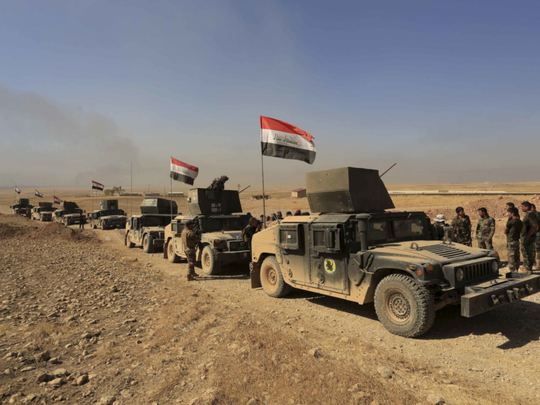
“The only certainty about the battle for Mosul is that this large Iraqi city will be wrested from the control of [Daesh]. With tens of thousands of Iraqi army and militia forces deployed, backed by US airpower and artillery, the military outcome can hardly be in doubt. [US] President [Barack] Obama surely hopes to preside over the clearing of the city before leaving office, and he has a good chance of doing so. Whether he, and Iraqi Prime Minister Haider Al Abadi, will be able to claim victory may be quite another matter,” said the Washington Post in an editorial.
Outlining the context of the operation, the newspaper said: “As the history of previous offensives in Iraq has painfully demonstrated, an enduring defeat of [Daesh] will depend mostly on non-military factors, including the physical and humanitarian costs it imposes and whether it is followed by workable political arrangements. The United States and its Iraqi allies failed on those fronts in 2003 and 2007 — and the outlook for Mosul in 2016 is mixed, at best.”The paper also blamed Obama for the current turmoil in Iraq and said: “Ultimately, victory over terrorist forces in Iraq will require a sustained American presence, both military and civilian, extending well beyond the liberation of Mosul. The president should be laying the groundwork for that now, with Mr Al Abadi and with US allies, so that his successor can avoid Mr Obama’s signal mistake in Iraq: a premature and self-defeating withdrawal.”
The Chicago Tribune took up the question of the aftermath for deeper examination. “Few doubt that the offensive now underway in Mosul, Iraq’s second-largest city, will end [Daesh’s] barbaric two-year rule there. The question is how to manage the aftermath so it doesn’t plunge Iraq back into civil war. You almost need a scorecard to keep track of all the players in the effort to liberate the ethnically diverse metropolis: the Iraqi army; Iran-backed Shiite militias; a 10,000-man Sunni ‘tribal force’; various Kurdish peshmerga forces; Turkmen, Yazidi, Chaldean and Assyrian Christian resistance groups; and several hundred American special forces backed by US air power... They are all arrayed against just 5,000 or so [Daesh] fighters. It is a case where the spoils are going to be more problematic than the victory, Already there is talk in Iraq and the US Congress of turning Mosul and surrounding Ninevah Province into several quasi-autonomous ‘cantons’ along the lines of the Kurdish-protected zone created after the Gulf War. This is a terrible idea” the paper said.
The Toronto Sun meanwhile urged Canadians and the world to support the military campaign against Daesh in Mosul and said: “There are still about a million residents living in the city, located in northern Iraq. Throughout all this time, they’ve been terrorised and held hostage by [Daesh]. Now it’s time to free them. Iraqi forces, Kurdish Peshmerga, coalition members and, yes, Canadians, are playing their part. There are dozens of Canadians on the ground, mostly advising the Kurds. And while the Trudeau government has been tight-lipped on exactly what our Canadian Forces members are up to, there can be no doubt they will be in firefights. They will be taking up arms against the enemy. [Daesh] is up against the wall. We’ve got a key stronghold cornered. It won’t be a quick or easy fight. Coalition strategists predict street-by-street combat to come.”
British paper The Independent analysed the military strategy in place for the offensive and said: “The assault on Mosul has been telegraphed well in advance and commenced broadly on the date that politicians and military commanders in countries involved in the operation have been publicly talking about. This is relevant because it shows that the need to surprise the enemy was not a factor of paramount importance. [Daesh] had been well aware that, after the recapture of Tikrit, Ramadi and Fallujah from their shrinking caliphate, Mosul, Iraq’s second-largest city and the loss of which was such a humiliation for the Baghdad government, would be the next target.”
But it also concurred with the majority of media outlets in worrying about the future of Mosul. “The real problem for this mission will start when that happens. The reason [Daesh] was able to make such a rapid advance in the west and north of Iraq was because it exploited the anger and resentment felt by the Sunni population at their treatment in the hands of the [Shiite]-dominated government of [former Iraqi prime minister] Nouri Al Maliki. The US and Britain, responsible for the disastrous invasion of Iraq... could be charged with being oblivious to the divisive sectarian policies being carried out.. or knowing and not foreseeing what this may bring. These bitter sectarian scars have not healed, and that is where the danger lies with Mosul.”




_resources1_16a31069e4e_small.jpg)







